A Case Study on Stress and Nursing Practice: Importance of Debriefing
VerifiedAdded on 2022/11/28
|6
|1568
|175
Report
AI Summary
This report presents a case study centered on a nursing student's experience in a respiratory unit, where a critical incident involving a patient with cystic fibrosis highlighted the importance of adhering to protocols and practicing interpersonal skills. The student's initial frustration with the patient's behavior led to a near-miss situation, emphasizing the need for careful patient assessment. The subsequent analysis underscores the benefits of debriefing in healthcare, including improved learning, performance, and emotional support for professionals. The report details the value of debriefing in addressing adverse events, improving patient safety, and fostering a supportive organizational culture. It also explores the practical application of debriefing in the workplace, emphasizing its role in stress management and enhancing the quality of care. The student's experience led to seeking mentorship and support to cope with stress, highlighting the importance of continuous professional development and well-being within the nursing profession. The report concludes by reinforcing debriefing as a vital component of stress management, reflection, and continuous improvement in nursing practice.
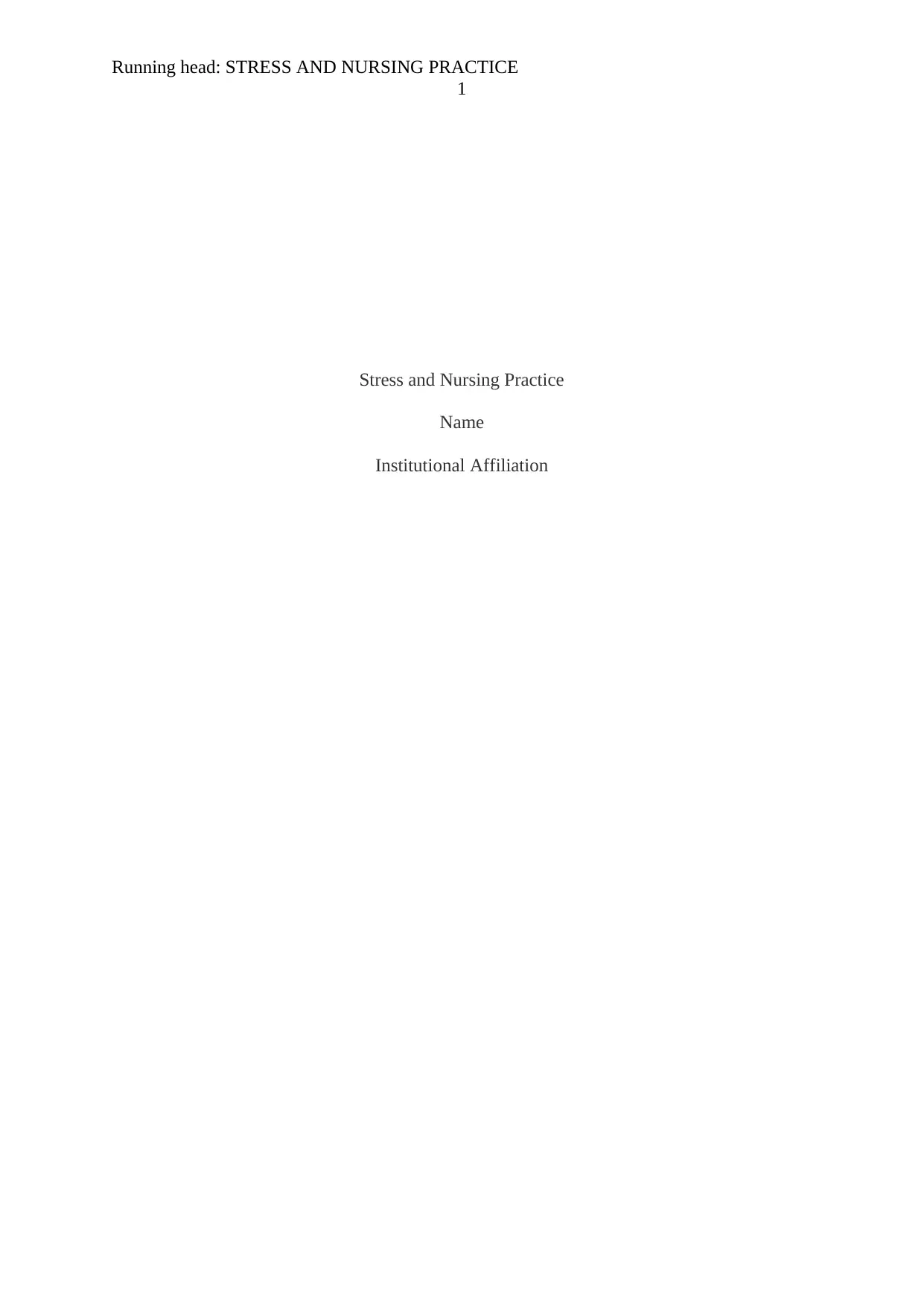
Running head: STRESS AND NURSING PRACTICE
1
Stress and Nursing Practice
Name
Institutional Affiliation
1
Stress and Nursing Practice
Name
Institutional Affiliation
Paraphrase This Document
Need a fresh take? Get an instant paraphrase of this document with our AI Paraphraser
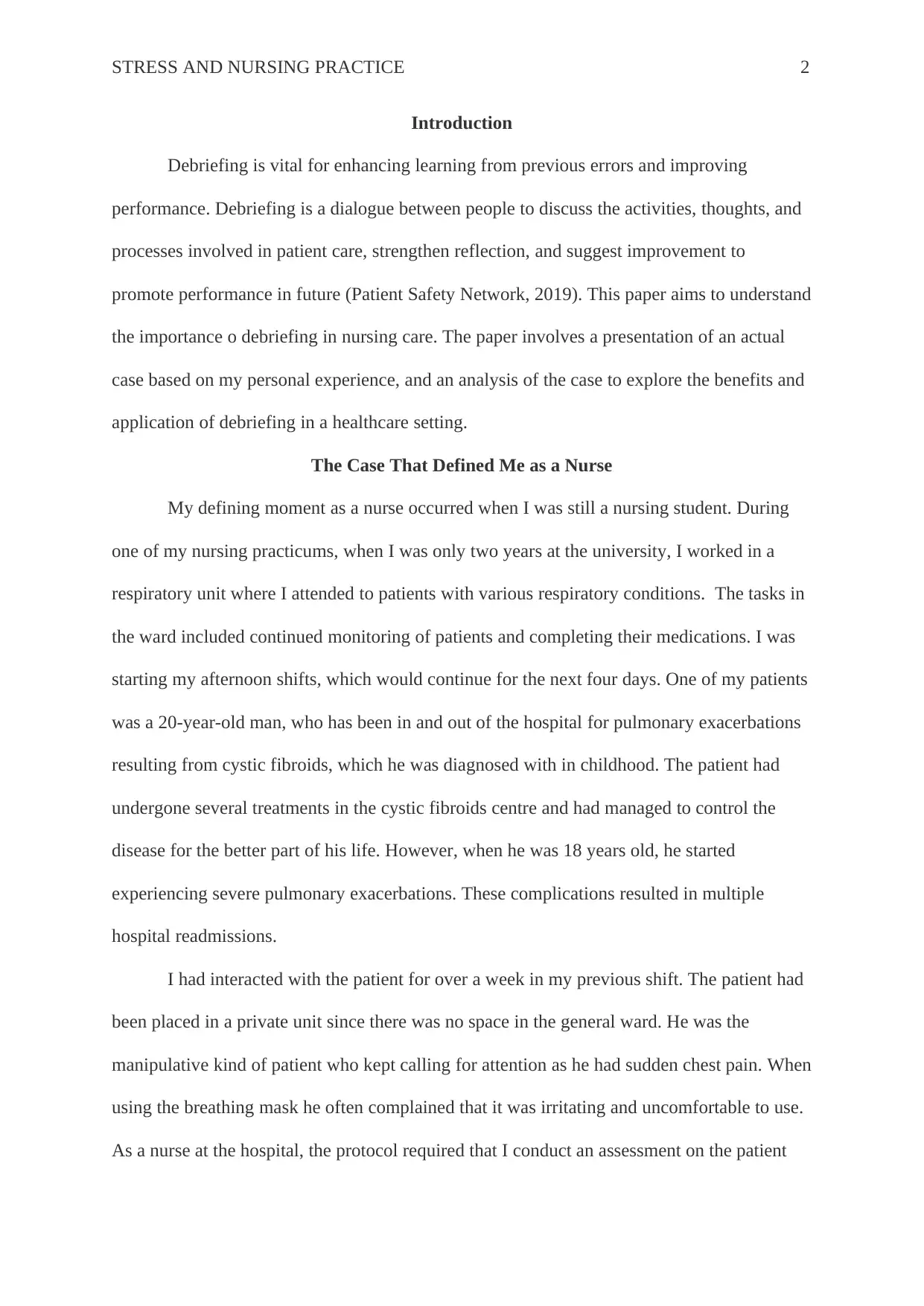
STRESS AND NURSING PRACTICE 2
Introduction
Debriefing is vital for enhancing learning from previous errors and improving
performance. Debriefing is a dialogue between people to discuss the activities, thoughts, and
processes involved in patient care, strengthen reflection, and suggest improvement to
promote performance in future (Patient Safety Network, 2019). This paper aims to understand
the importance o debriefing in nursing care. The paper involves a presentation of an actual
case based on my personal experience, and an analysis of the case to explore the benefits and
application of debriefing in a healthcare setting.
The Case That Defined Me as a Nurse
My defining moment as a nurse occurred when I was still a nursing student. During
one of my nursing practicums, when I was only two years at the university, I worked in a
respiratory unit where I attended to patients with various respiratory conditions. The tasks in
the ward included continued monitoring of patients and completing their medications. I was
starting my afternoon shifts, which would continue for the next four days. One of my patients
was a 20-year-old man, who has been in and out of the hospital for pulmonary exacerbations
resulting from cystic fibroids, which he was diagnosed with in childhood. The patient had
undergone several treatments in the cystic fibroids centre and had managed to control the
disease for the better part of his life. However, when he was 18 years old, he started
experiencing severe pulmonary exacerbations. These complications resulted in multiple
hospital readmissions.
I had interacted with the patient for over a week in my previous shift. The patient had
been placed in a private unit since there was no space in the general ward. He was the
manipulative kind of patient who kept calling for attention as he had sudden chest pain. When
using the breathing mask he often complained that it was irritating and uncomfortable to use.
As a nurse at the hospital, the protocol required that I conduct an assessment on the patient
Introduction
Debriefing is vital for enhancing learning from previous errors and improving
performance. Debriefing is a dialogue between people to discuss the activities, thoughts, and
processes involved in patient care, strengthen reflection, and suggest improvement to
promote performance in future (Patient Safety Network, 2019). This paper aims to understand
the importance o debriefing in nursing care. The paper involves a presentation of an actual
case based on my personal experience, and an analysis of the case to explore the benefits and
application of debriefing in a healthcare setting.
The Case That Defined Me as a Nurse
My defining moment as a nurse occurred when I was still a nursing student. During
one of my nursing practicums, when I was only two years at the university, I worked in a
respiratory unit where I attended to patients with various respiratory conditions. The tasks in
the ward included continued monitoring of patients and completing their medications. I was
starting my afternoon shifts, which would continue for the next four days. One of my patients
was a 20-year-old man, who has been in and out of the hospital for pulmonary exacerbations
resulting from cystic fibroids, which he was diagnosed with in childhood. The patient had
undergone several treatments in the cystic fibroids centre and had managed to control the
disease for the better part of his life. However, when he was 18 years old, he started
experiencing severe pulmonary exacerbations. These complications resulted in multiple
hospital readmissions.
I had interacted with the patient for over a week in my previous shift. The patient had
been placed in a private unit since there was no space in the general ward. He was the
manipulative kind of patient who kept calling for attention as he had sudden chest pain. When
using the breathing mask he often complained that it was irritating and uncomfortable to use.
As a nurse at the hospital, the protocol required that I conduct an assessment on the patient
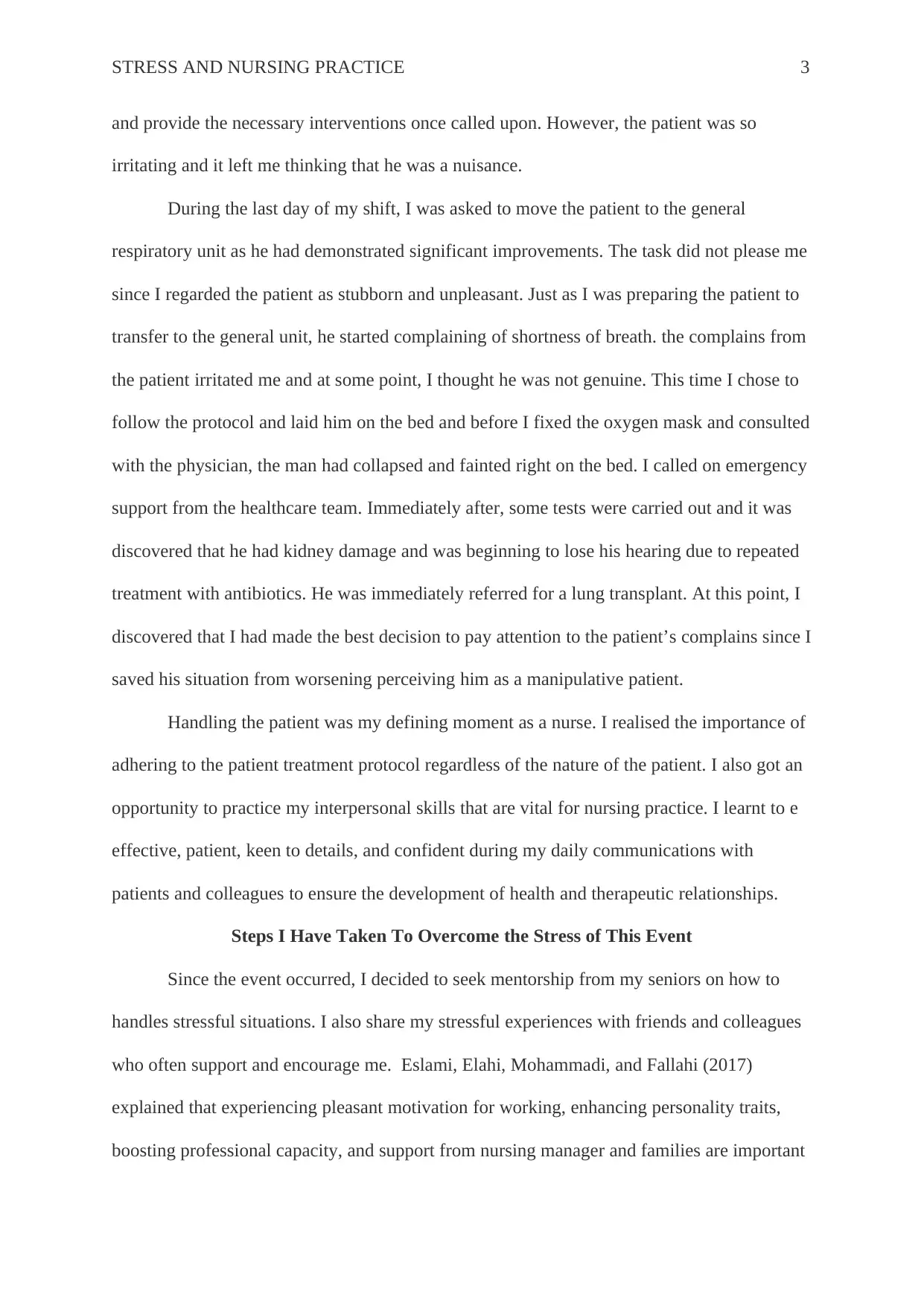
STRESS AND NURSING PRACTICE 3
and provide the necessary interventions once called upon. However, the patient was so
irritating and it left me thinking that he was a nuisance.
During the last day of my shift, I was asked to move the patient to the general
respiratory unit as he had demonstrated significant improvements. The task did not please me
since I regarded the patient as stubborn and unpleasant. Just as I was preparing the patient to
transfer to the general unit, he started complaining of shortness of breath. the complains from
the patient irritated me and at some point, I thought he was not genuine. This time I chose to
follow the protocol and laid him on the bed and before I fixed the oxygen mask and consulted
with the physician, the man had collapsed and fainted right on the bed. I called on emergency
support from the healthcare team. Immediately after, some tests were carried out and it was
discovered that he had kidney damage and was beginning to lose his hearing due to repeated
treatment with antibiotics. He was immediately referred for a lung transplant. At this point, I
discovered that I had made the best decision to pay attention to the patient’s complains since I
saved his situation from worsening perceiving him as a manipulative patient.
Handling the patient was my defining moment as a nurse. I realised the importance of
adhering to the patient treatment protocol regardless of the nature of the patient. I also got an
opportunity to practice my interpersonal skills that are vital for nursing practice. I learnt to e
effective, patient, keen to details, and confident during my daily communications with
patients and colleagues to ensure the development of health and therapeutic relationships.
Steps I Have Taken To Overcome the Stress of This Event
Since the event occurred, I decided to seek mentorship from my seniors on how to
handles stressful situations. I also share my stressful experiences with friends and colleagues
who often support and encourage me. Eslami, Elahi, Mohammadi, and Fallahi (2017)
explained that experiencing pleasant motivation for working, enhancing personality traits,
boosting professional capacity, and support from nursing manager and families are important
and provide the necessary interventions once called upon. However, the patient was so
irritating and it left me thinking that he was a nuisance.
During the last day of my shift, I was asked to move the patient to the general
respiratory unit as he had demonstrated significant improvements. The task did not please me
since I regarded the patient as stubborn and unpleasant. Just as I was preparing the patient to
transfer to the general unit, he started complaining of shortness of breath. the complains from
the patient irritated me and at some point, I thought he was not genuine. This time I chose to
follow the protocol and laid him on the bed and before I fixed the oxygen mask and consulted
with the physician, the man had collapsed and fainted right on the bed. I called on emergency
support from the healthcare team. Immediately after, some tests were carried out and it was
discovered that he had kidney damage and was beginning to lose his hearing due to repeated
treatment with antibiotics. He was immediately referred for a lung transplant. At this point, I
discovered that I had made the best decision to pay attention to the patient’s complains since I
saved his situation from worsening perceiving him as a manipulative patient.
Handling the patient was my defining moment as a nurse. I realised the importance of
adhering to the patient treatment protocol regardless of the nature of the patient. I also got an
opportunity to practice my interpersonal skills that are vital for nursing practice. I learnt to e
effective, patient, keen to details, and confident during my daily communications with
patients and colleagues to ensure the development of health and therapeutic relationships.
Steps I Have Taken To Overcome the Stress of This Event
Since the event occurred, I decided to seek mentorship from my seniors on how to
handles stressful situations. I also share my stressful experiences with friends and colleagues
who often support and encourage me. Eslami, Elahi, Mohammadi, and Fallahi (2017)
explained that experiencing pleasant motivation for working, enhancing personality traits,
boosting professional capacity, and support from nursing manager and families are important
⊘ This is a preview!⊘
Do you want full access?
Subscribe today to unlock all pages.

Trusted by 1+ million students worldwide
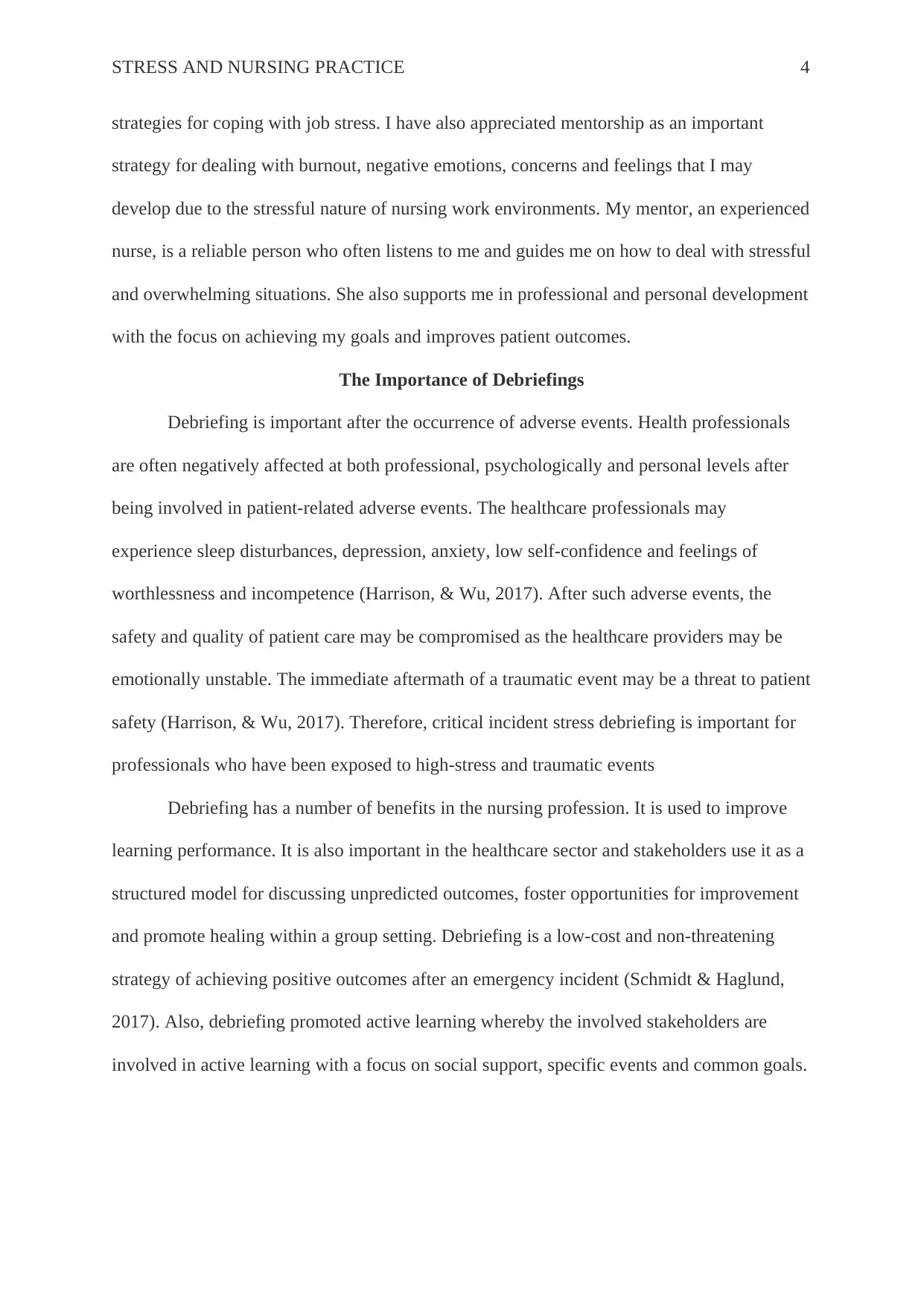
STRESS AND NURSING PRACTICE 4
strategies for coping with job stress. I have also appreciated mentorship as an important
strategy for dealing with burnout, negative emotions, concerns and feelings that I may
develop due to the stressful nature of nursing work environments. My mentor, an experienced
nurse, is a reliable person who often listens to me and guides me on how to deal with stressful
and overwhelming situations. She also supports me in professional and personal development
with the focus on achieving my goals and improves patient outcomes.
The Importance of Debriefings
Debriefing is important after the occurrence of adverse events. Health professionals
are often negatively affected at both professional, psychologically and personal levels after
being involved in patient-related adverse events. The healthcare professionals may
experience sleep disturbances, depression, anxiety, low self-confidence and feelings of
worthlessness and incompetence (Harrison, & Wu, 2017). After such adverse events, the
safety and quality of patient care may be compromised as the healthcare providers may be
emotionally unstable. The immediate aftermath of a traumatic event may be a threat to patient
safety (Harrison, & Wu, 2017). Therefore, critical incident stress debriefing is important for
professionals who have been exposed to high-stress and traumatic events
Debriefing has a number of benefits in the nursing profession. It is used to improve
learning performance. It is also important in the healthcare sector and stakeholders use it as a
structured model for discussing unpredicted outcomes, foster opportunities for improvement
and promote healing within a group setting. Debriefing is a low-cost and non-threatening
strategy of achieving positive outcomes after an emergency incident (Schmidt & Haglund,
2017). Also, debriefing promoted active learning whereby the involved stakeholders are
involved in active learning with a focus on social support, specific events and common goals.
strategies for coping with job stress. I have also appreciated mentorship as an important
strategy for dealing with burnout, negative emotions, concerns and feelings that I may
develop due to the stressful nature of nursing work environments. My mentor, an experienced
nurse, is a reliable person who often listens to me and guides me on how to deal with stressful
and overwhelming situations. She also supports me in professional and personal development
with the focus on achieving my goals and improves patient outcomes.
The Importance of Debriefings
Debriefing is important after the occurrence of adverse events. Health professionals
are often negatively affected at both professional, psychologically and personal levels after
being involved in patient-related adverse events. The healthcare professionals may
experience sleep disturbances, depression, anxiety, low self-confidence and feelings of
worthlessness and incompetence (Harrison, & Wu, 2017). After such adverse events, the
safety and quality of patient care may be compromised as the healthcare providers may be
emotionally unstable. The immediate aftermath of a traumatic event may be a threat to patient
safety (Harrison, & Wu, 2017). Therefore, critical incident stress debriefing is important for
professionals who have been exposed to high-stress and traumatic events
Debriefing has a number of benefits in the nursing profession. It is used to improve
learning performance. It is also important in the healthcare sector and stakeholders use it as a
structured model for discussing unpredicted outcomes, foster opportunities for improvement
and promote healing within a group setting. Debriefing is a low-cost and non-threatening
strategy of achieving positive outcomes after an emergency incident (Schmidt & Haglund,
2017). Also, debriefing promoted active learning whereby the involved stakeholders are
involved in active learning with a focus on social support, specific events and common goals.
Paraphrase This Document
Need a fresh take? Get an instant paraphrase of this document with our AI Paraphraser
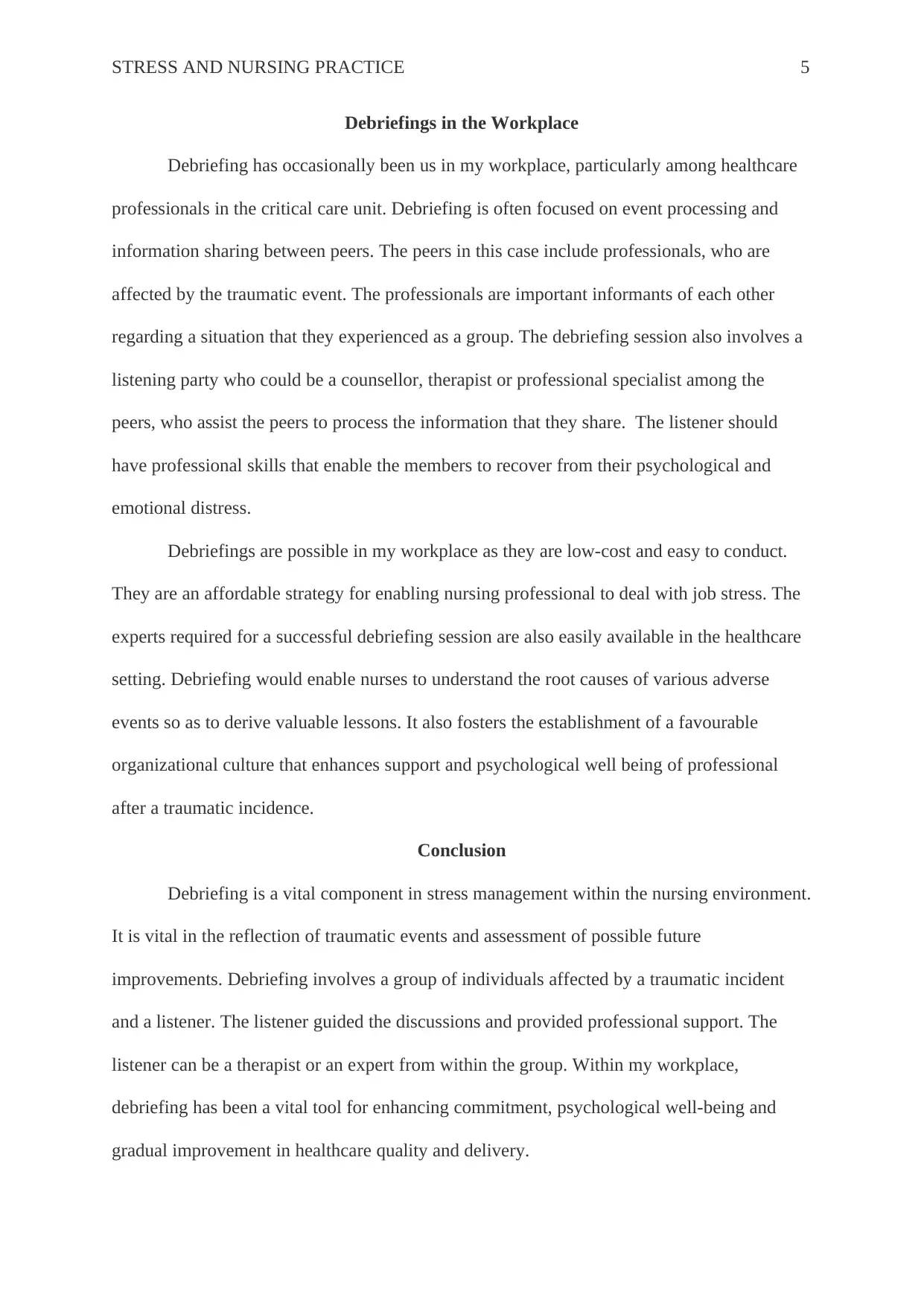
STRESS AND NURSING PRACTICE 5
Debriefings in the Workplace
Debriefing has occasionally been us in my workplace, particularly among healthcare
professionals in the critical care unit. Debriefing is often focused on event processing and
information sharing between peers. The peers in this case include professionals, who are
affected by the traumatic event. The professionals are important informants of each other
regarding a situation that they experienced as a group. The debriefing session also involves a
listening party who could be a counsellor, therapist or professional specialist among the
peers, who assist the peers to process the information that they share. The listener should
have professional skills that enable the members to recover from their psychological and
emotional distress.
Debriefings are possible in my workplace as they are low-cost and easy to conduct.
They are an affordable strategy for enabling nursing professional to deal with job stress. The
experts required for a successful debriefing session are also easily available in the healthcare
setting. Debriefing would enable nurses to understand the root causes of various adverse
events so as to derive valuable lessons. It also fosters the establishment of a favourable
organizational culture that enhances support and psychological well being of professional
after a traumatic incidence.
Conclusion
Debriefing is a vital component in stress management within the nursing environment.
It is vital in the reflection of traumatic events and assessment of possible future
improvements. Debriefing involves a group of individuals affected by a traumatic incident
and a listener. The listener guided the discussions and provided professional support. The
listener can be a therapist or an expert from within the group. Within my workplace,
debriefing has been a vital tool for enhancing commitment, psychological well-being and
gradual improvement in healthcare quality and delivery.
Debriefings in the Workplace
Debriefing has occasionally been us in my workplace, particularly among healthcare
professionals in the critical care unit. Debriefing is often focused on event processing and
information sharing between peers. The peers in this case include professionals, who are
affected by the traumatic event. The professionals are important informants of each other
regarding a situation that they experienced as a group. The debriefing session also involves a
listening party who could be a counsellor, therapist or professional specialist among the
peers, who assist the peers to process the information that they share. The listener should
have professional skills that enable the members to recover from their psychological and
emotional distress.
Debriefings are possible in my workplace as they are low-cost and easy to conduct.
They are an affordable strategy for enabling nursing professional to deal with job stress. The
experts required for a successful debriefing session are also easily available in the healthcare
setting. Debriefing would enable nurses to understand the root causes of various adverse
events so as to derive valuable lessons. It also fosters the establishment of a favourable
organizational culture that enhances support and psychological well being of professional
after a traumatic incidence.
Conclusion
Debriefing is a vital component in stress management within the nursing environment.
It is vital in the reflection of traumatic events and assessment of possible future
improvements. Debriefing involves a group of individuals affected by a traumatic incident
and a listener. The listener guided the discussions and provided professional support. The
listener can be a therapist or an expert from within the group. Within my workplace,
debriefing has been a vital tool for enhancing commitment, psychological well-being and
gradual improvement in healthcare quality and delivery.
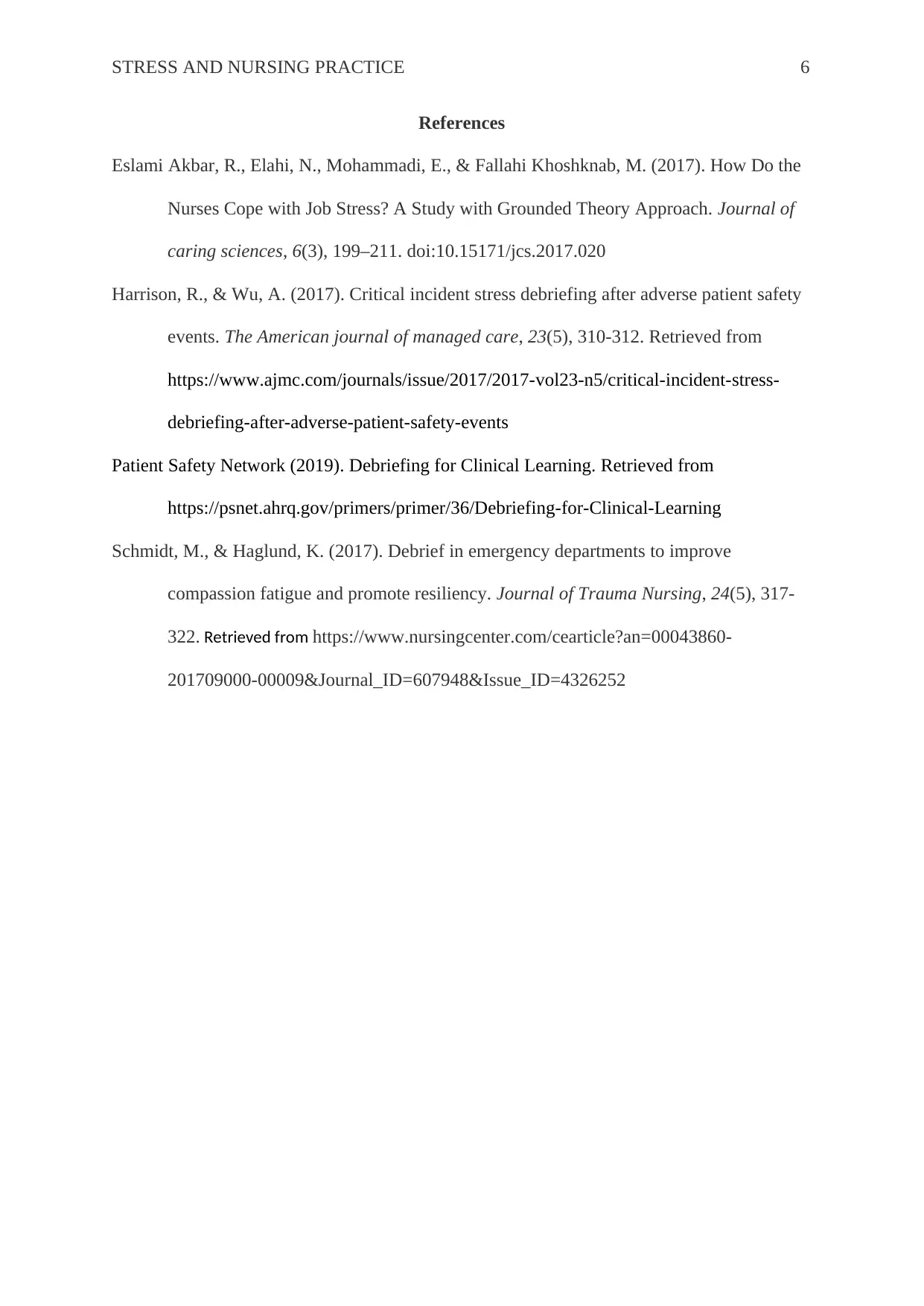
STRESS AND NURSING PRACTICE 6
References
Eslami Akbar, R., Elahi, N., Mohammadi, E., & Fallahi Khoshknab, M. (2017). How Do the
Nurses Cope with Job Stress? A Study with Grounded Theory Approach. Journal of
caring sciences, 6(3), 199–211. doi:10.15171/jcs.2017.020
Harrison, R., & Wu, A. (2017). Critical incident stress debriefing after adverse patient safety
events. The American journal of managed care, 23(5), 310-312. Retrieved from
https://www.ajmc.com/journals/issue/2017/2017-vol23-n5/critical-incident-stress-
debriefing-after-adverse-patient-safety-events
Patient Safety Network (2019). Debriefing for Clinical Learning. Retrieved from
https://psnet.ahrq.gov/primers/primer/36/Debriefing-for-Clinical-Learning
Schmidt, M., & Haglund, K. (2017). Debrief in emergency departments to improve
compassion fatigue and promote resiliency. Journal of Trauma Nursing, 24(5), 317-
322. Retrieved from https://www.nursingcenter.com/cearticle?an=00043860-
201709000-00009&Journal_ID=607948&Issue_ID=4326252
References
Eslami Akbar, R., Elahi, N., Mohammadi, E., & Fallahi Khoshknab, M. (2017). How Do the
Nurses Cope with Job Stress? A Study with Grounded Theory Approach. Journal of
caring sciences, 6(3), 199–211. doi:10.15171/jcs.2017.020
Harrison, R., & Wu, A. (2017). Critical incident stress debriefing after adverse patient safety
events. The American journal of managed care, 23(5), 310-312. Retrieved from
https://www.ajmc.com/journals/issue/2017/2017-vol23-n5/critical-incident-stress-
debriefing-after-adverse-patient-safety-events
Patient Safety Network (2019). Debriefing for Clinical Learning. Retrieved from
https://psnet.ahrq.gov/primers/primer/36/Debriefing-for-Clinical-Learning
Schmidt, M., & Haglund, K. (2017). Debrief in emergency departments to improve
compassion fatigue and promote resiliency. Journal of Trauma Nursing, 24(5), 317-
322. Retrieved from https://www.nursingcenter.com/cearticle?an=00043860-
201709000-00009&Journal_ID=607948&Issue_ID=4326252
⊘ This is a preview!⊘
Do you want full access?
Subscribe today to unlock all pages.

Trusted by 1+ million students worldwide
1 out of 6
Related Documents
Your All-in-One AI-Powered Toolkit for Academic Success.
+13062052269
info@desklib.com
Available 24*7 on WhatsApp / Email
![[object Object]](/_next/static/media/star-bottom.7253800d.svg)
Unlock your academic potential
Copyright © 2020–2026 A2Z Services. All Rights Reserved. Developed and managed by ZUCOL.





